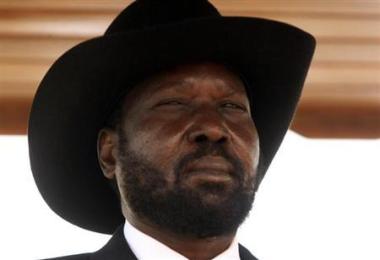South Sudan president vows to stop conflict escalating into civil war
December 19, 2013 (JUBA) – South Sudan president Salva Kiir has vowed to prevent the escalating violence in the country from developing in to a civil war. Infighting within the army’s presidential guard began on Sunday evening and has since spread from the capital, Juba, to Unity and Jonglei state.

Ateny categorically denied reports that the crackdown was singling out individuals based on their ethnic backgrounds. The government is only hunting those that are alleged to have been part of plot to depose Kiir.
The South Sudanese army (SPLA) spokesperson said on Thursday that fighting in the capital Juba has resulted in the deaths 450 people, including around 100 soldiers.
“There has never been a question of an ethnic cleansing operation. The hunt was only for the coup plotters who come from different states of South Sudan. Why the democratically government would targets its own citizens?” said Ateny.
However, Human Rights Watch reports that SPLA “soldiers fired indiscriminately in highly populated areas and targeted people for their ethnicity during recent fighting in Juba”.
In a statement the New York-based human rights watchdog said: “The clashes in South Sudan’s capital, which broke out on December 15, 2013, saw scores of civilians killed and, according to witnesses and victims, soldiers specifically targeted people from the Nuer ethnic group.”
South Sudan’s former deputy Riek Machar is a Nuer, while Kiir is a Dinka – the country’s dominant ethnic group. The security services have arrested eleven senior members of the ruling SPLM, who are from a variety of South Sudan’s many tribes including some Dinka.
Machar remains on the run and his location is unknown but he told Radio France Internationale that he wants a “palace revolution” to topple Kiir from power. Despite ordering Machar’s arrest Kiir has said his willing to talk his political rival.
On Wednesday the fighting spread to Jonglei state, where the government is already fighting a rebellion in Pibor county, when a group led by Peter Gatdet defected and attacked the state capital, Bor. The SPLA says Gatdet’s group have taken control of the town.
The UN has said that armed men attacked their peacekeeping base in Jonglei’s Akobo county on Thursday. Some of the civilians who were sheltering at the United Nations Mission in South Sudan compound have been killed. A witness who escaped the attack told Sudan Tribune that 15 people were killed.
South Sudan’s foreign Affairs and international cooperation minister, Barnaba Marial Benjamin, said president Kiir and the government remains committed to ensuring that peace prevails in the country.
“We are doing everything in our capacity as the government to ensure that peace prevails. We are a democratic country with commitment to upholding democratic principles. If someone wants to be a president, he must come through elections not through violence. This is not allowed by the constitution which the supreme law of this country. Nobody is above it”, said Benjamin.
Benjamin was speaking to journalists at Juba International Airport where he was receiving foreign ministers from the neighbouring countries, who have been dispatched by the African Union to assessment the situation and mediate between the two sides.
The Chairperson of the AU Commission on Thursday expressed concern and commended Ethiopian Prime Minister Hailemariamesalegn of Ethiopia, in his capacity as Chair of the Inter-Governmental Authority on Development (IGAD) and current Chair of AU, for his timely initiative to dispatch a ministerial delegation to Juba.
The delegation is comprised of ministers and high level officials from Ethiopia, Djibouti, Kenya, Somali, Sudan and Uganda, as well as the AU Commissioner for Peace and Security.
At its 409th meeting on Wednesday the Peace and Security Council of the AU, encouraged regional and international efforts to help diffuse the current tension and to support the South Sudanese parties to find a peaceful political settlement to the crisis.
(ST)
